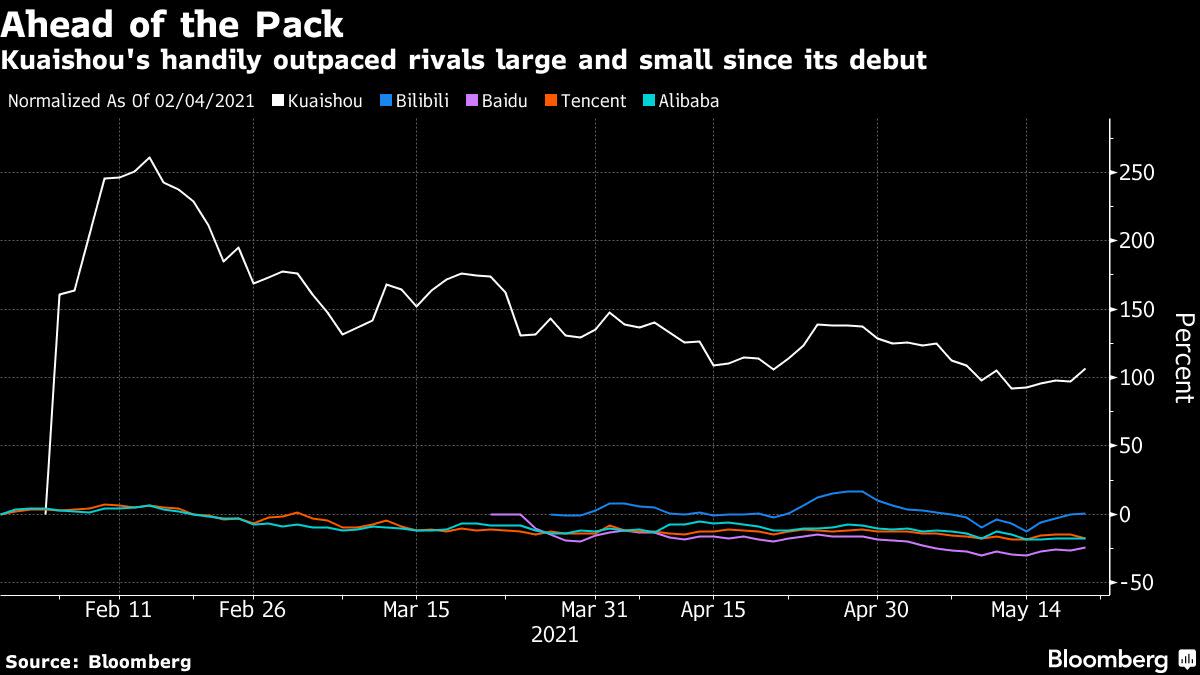ByteDance Foe Kuaishou Drops as Livestreaming Sinks, Costs Jump

(Bloomberg) — Kuaishou Technology shares tumbled after the rival to TikTok-owner ByteDance Ltd. reported a faster decline in its livestreaming business while boosting investments in newer businesses.
The stock slumped nearly 8% in Hong Kong Tuesday, after analysts at brokerages including Morgan Stanley cut their share-price targets. While revenue climbed 37% to 17 billion yuan ($2.65 billion) in the three months ended March, sales from its livestreaming business fell almost three times faster than a year earlier. Sales and marketing expenses surged to roughly 69% of revenue, while spending on R&D tripled after the short-video giant boosted hiring to grow advanced technologies like artificial intelligence.
Kuaishou, the operator of China’s most popular short-video platform after ByteDance’s Douyin, is trying to establish its place among a generation of mega-startups like food delivery giant Meituan and ride-hailing leader Didi. Shares in the Tencent Holdings Ltd.-backed outfit had more than doubled since its February initial public offering, the top performer among recent major Chinese tech listings in Hong Kong.
But founder Su Hua’s company, which is expanding beyond its roots in video content, is grappling with an influx of rivals from up-and-comers like Bilibili Inc. to WeChat. Tencent’s ubiquitous social app is venturing into TikTok-style clips, taking a page straight out of ByteDance and Kuaishou’s playbook. Advertising has surpassed virtual gifts or tips during live-streaming to become Kuaishou’s biggest earnings driver, while its nascent online marketplace continues to grow several-fold from a low base.
“Though Kuaishou’s diversified revenue mix helps absorb decline in its core live streaming revenues, given the intense competition in the online advertising and livestreaming markets in China, we would be reluctant to make an entry despite the drop in Kuaishou’s multiples,” LightStream Research analyst Shifara Samsudeen wrote in a note published on the Smartkarma website.
Read more: Ex-Googler Turns Virtual Gifts Into a $61 Billion Business
Kuaishou’s results are closely watched by investors who fancy a slice of the Chinese social video market before ByteDance’s eventual stock market debut. The world’s most valuable startup is seeking to boost Chinese ad revenue by more than 40% and triple the size of its e-commerce business this year, according to an internal memo.
Results unveiled by the smaller company suggest the competition could be heating up. Kuaishou’s monthly active users expanded slower to 520 million, up from the 495 million users a year earlier. Growth in online advertising sales eased to 161%, versus 170% in the December quarter. Livestreaming revenue fell 20%, accelerating from the 7% decline in the prior quarter, in part because of strict quarantine measures imposed at the start of 2020.
The division that includes e-commerce posted the strongest sales growth, rising seven fold, after the firm recorded gross merchandise value of 118.6 billion yuan, more than tripling from the year-earlier period.
Kuaishou boosted spending on infrastructure and tools for online shopping during the first quarter as well as in acquiring users overseas. Having amassed more than 300 million daily users across its domestic platforms, the company now hopes to replicate its success globally with apps like Kwai and Snack Video. Outside China, the company had more than 150 million users in April, up from over 100 million in the first quarter, the earnings results showed.
The overseas expansion comes as Kuaishou faces tougher antitrust scrutiny at home. It was among 34 leading Chinese internet firms ordered to comply with anti-monopoly rules in April and the company was recently rapped by the cyberspace regulator for its data-collection policies.
“At Kuaishou, we believe strongly that one shall have peace of mind when he possesses a piece of land, and one possesses a piece of land when he has peace of mind,” it said Monday. “Starting in the first quarter of 2021, we have put greater emphasis on improving the value of our content creator’s private domain, the place on our platform where all content and products of a creator can be found and where creators build and nurture their followings.”
More stories like this are available on bloomberg.com
Subscribe now to stay ahead with the most trusted business news source.
©2021 Bloomberg L.P.




